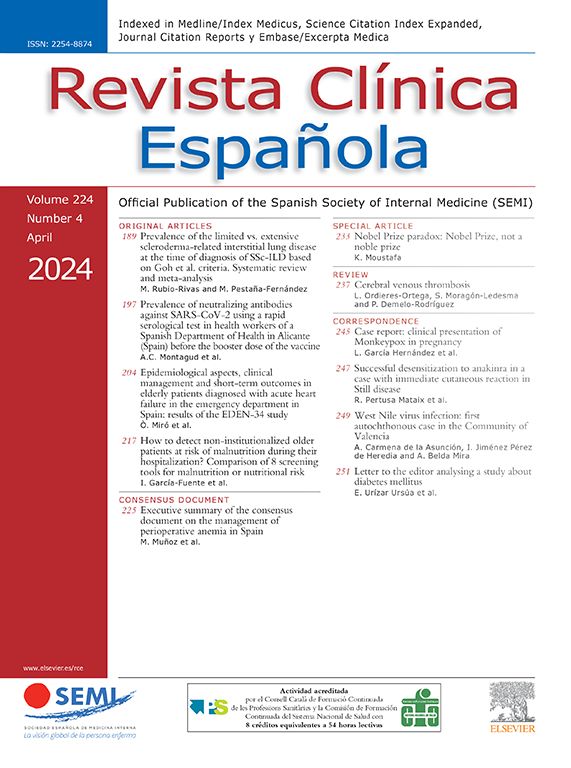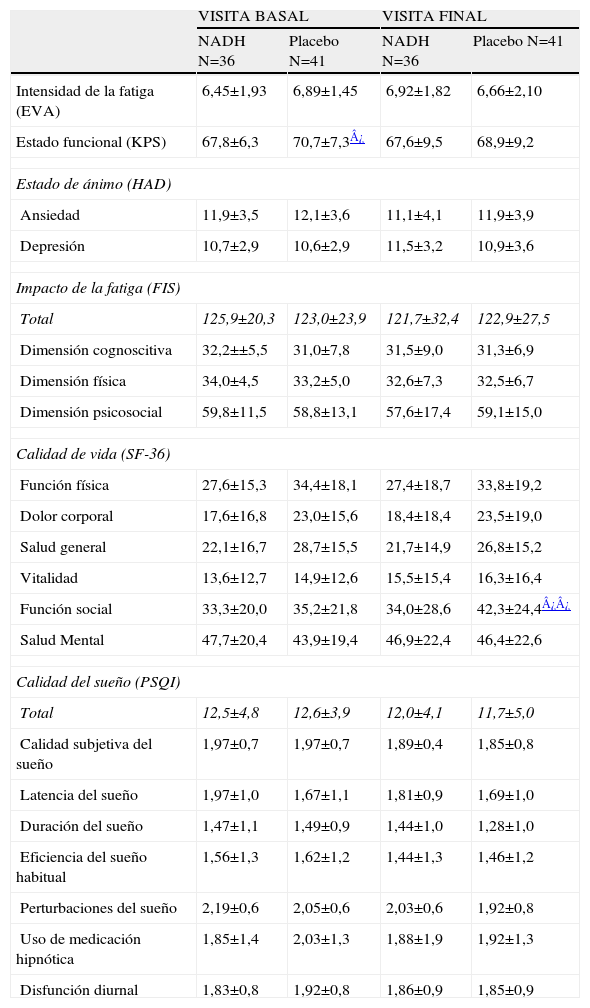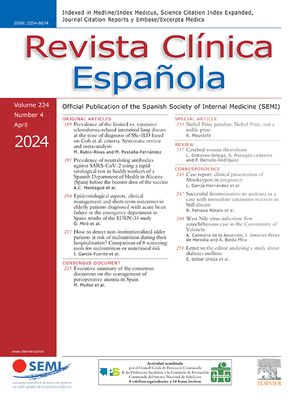La nicotinamida adenina dinucleótido (NADH) podría estar deplecionada en el síndrome de fatiga crónica. El objetivo del estudio fue evaluar la eficacia de la suplementación con NADH en estos pacientes.
Material y métodosSe realizó un ensayo clínico, doble ciego, controlado con placebo de 3 meses de duración. Los pacientes fueron randomizados a NADH oral 20mg o placebo durante los 2 primeros meses. Se evaluó la intensidad de la fatiga, estado funcional, estado de ánimo, impacto funcional de la fatiga, calidad de vida, calidad del sueño, capacidad al ejercicio y reserva funcional, así como la opinión del investigador y pacientes sobre la eficacia de la intervención, antes y a los 30, 60 y 90 días del inicio del tratamiento. En la visita basal y a los 60 días (último día de tratamiento doble ciego) se realizó una prueba de esfuerzo.
ResultadosSe incluyeron 86 enfermos de los cuales 77 concluyeron el estudio (edad media, 47 años; 72 mujeres). No se hallaron diferencias significativas en la mayoría de las variables estudiadas al finalizar el estudio. La administración de NADH se asoció a una disminución de estado de ansiedad de −1,0 puntos (p<0,05) y de −0,2 puntos (p=NS) en el grupo asignado a placebo. La frecuencia cardiaca máxima tras la prueba de esfuerzo disminuyó una media de −8,1l/min (p<0,05) en el grupo NADH y ascendió +1,7l/min en el grupo placebo (p=0,73). No se hallaron diferencias en la percepción de eficacia con NADH y placebo, por parte del investigador y pacientes.
ConclusionesLa administración de NADH oral se asoció a una disminución de la ansiedad y de la frecuencia cardiaca máxima, tras una prueba de esfuerzo, en los pacientes con síndrome de fatiga crónica. Por el contrario, este tratamiento no modificó otras variables clínicas y el estado funcional global.
Nicotinamide adenine dinucleotide (NADH) may be depleted in chronic fatigue syndrome (SFC). The purpose of the study was to evaluate the efficacy of supplementation with NADH in these patients.
Material and methodsA double blind, placebo controlled, 3 month long clinical trial was conducted. The patients were randomized to oral NADH oral 20mg or placebo during the first two months. The intensity of the fatigue, functional performance, mood state, functional impact of the fatigue, quality of life, sleep quality, exercise capacity and functional reserve as well as the investigator's and patient's opinion on the efficacy of the intervention prior to and at 30, 60 and 90 days of the onset of the treatment were evaluated. A stress test was performed in the baseline visit and at 60 days (last day of the double blind treatment).
ResultsA total of 86 patients, 77 of whom completed the study (mean age, 47 years, 72 women) were enrolled. No significant differences were found in most of the variable studied at the end of the study. Administration of NADH was associated to a decrease in anxiety condition of −1.0 points (p<0.05) and of −0.2 points (p=NS) in the placebo assigned group. Maximum heart rate after the stress test decreased a mean of −8.1l/min (p<0.05) in the NADH group and increased by +1.7l/min in the placebo group (p=0.73). No differences were found in the perception of efficacy with NADH and placebo, by the investigator and patients.
ConclusionsAdministration of oral NADH was associated to a decrease in anxiety and maximum heart rate, after a stress test in patients with CFS. On the contrary, this treatment did not modify other clinical variables and the global functional performance.
Article
Diríjase desde aquí a la web de la >>>FESEMI<<< e inicie sesión mediante el formulario que se encuentra en la barra superior, pulsando sobre el candado.

Una vez autentificado, en la misma web de FESEMI, en el menú superior, elija la opción deseada.

>>>FESEMI<<<







